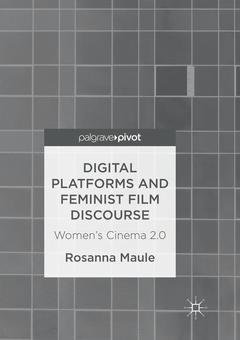Description
Digital Platforms and Feminist Film Discourse, 1st ed. 2016
Women’s Cinema 2.0
Author: Maule Rosanna
Language: English
Approximative price 58.01 €
In Print (Delivery period: 15 days).
Add to cart
Digital Platforms and Feminist Film Discourse
Publication date: 08-2018
Support: Print on demand
Publication date: 08-2018
Support: Print on demand
Digital Platforms and Feminist Film Discourse
Publication date: 09-2017
Support: Print on demand
Publication date: 09-2017
Support: Print on demand
Description
/li>Contents
/li>Biography
/li>Comment
/li>
This project offers a critical overview of how online activities and platforms are becoming an important source for the production and promotion of women?s films. Inspired by a transnational feminist framework, Maule examines blogs, websites, online services and projects related to women?s filmmaking in an interrogation of the very meaning of women?s cinema at the complex intersection with digital technology and globalization. It discusses women?s cinema 2.0 as a resistant type of cinematic expression and brings attention to the difficulties inherent in raising and expanding visibility for women?s filmic expression within a global sphere dominated by neo-liberalism and post-feminism. The author pays close attention to the challenges and contradictions involved in bringing a niche area of filmmaking and feminist discourse to the broad and diverse communities of the Internet and global media market, while also highlighting the changing forms of media and feminism.
1:Chapter One - New technologies of gender: Women and film in the digital era.- 2: Chapter 2 - Women make movies on the Web: digital platforms as alternative circuits.- 3. En-gendering the global market: Women’s cinema as a creative industry.- 4. Women and Online Porn in Canada: New Media, Old Debates.- Conclusions: Women Film Scholars Online.
Rosanna Maule is Associate Professor of Film Studies in the Mel Hoppenheim School of Cinema at Concordia University, Canada. She is the author of Beyond Auteurism (2008), the main editor of In the Dark Room (2009), and with Guylaine Dionne she co-directed the feature documentary Women Filmmakers: The State of Things (2017). She is part of the research team GRAFICS at Université de Montréal, on the Board of Directors of the Women’s Film History International, and an active member of the Global Women’s Cinema Project.
Seeks to interrogate the very meaning of women’s cinema at the complex intersection of digital technology and globalization Draws on transnational feminism and cyberfeminism Addresses issues of entrepreneurship, post-feminist neoliberalism, and cultural identity in the new sociocultural relations that women involved in film establish through techno-mediated environments
© 2024 LAVOISIER S.A.S.
These books may interest you

The Rise of Neoliberal Feminism 15.89 €

The Rise of Neoliberal Feminism 37.41 €

